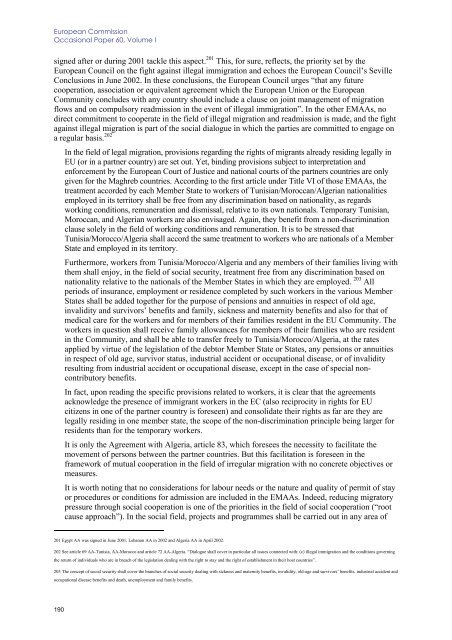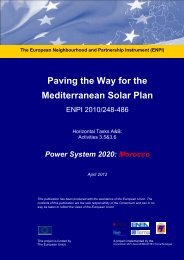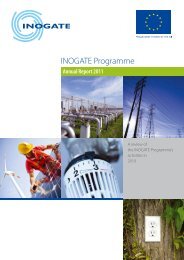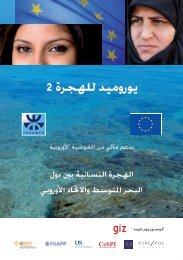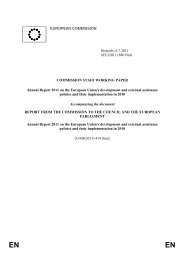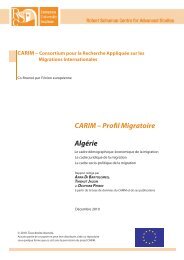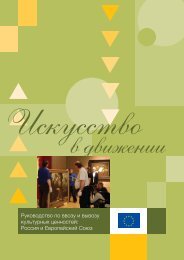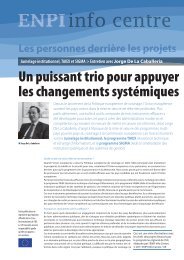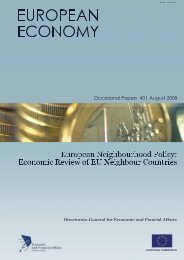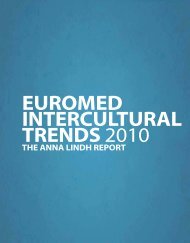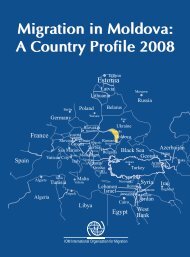<strong>European</strong> CommissionOccasional Paper 60, Volume Isigned after or during 2001 tackle this aspect. 201 This, for sure, reflects, the priority set by the<strong>European</strong> Council on the fight against illegal im<strong>migration</strong> <strong>and</strong> echoes the <strong>European</strong> Council’s SevilleConclusions in June 2002. In these conclusions, the <strong>European</strong> Council urges “that any futurecooperation, association or equivalent agreement which the <strong>European</strong> Union or the <strong>European</strong>Community concludes with any country should include a clause on joint management of <strong>migration</strong><strong>flows</strong> <strong>and</strong> on compulsory readmission in the event of illegal im<strong>migration</strong>”. In the other EMAAs, nodirect commitment to cooperate in the field of illegal <strong>migration</strong> <strong>and</strong> readmission is made, <strong>and</strong> the fightagainst illegal <strong>migration</strong> is part of the social dialogue in which the parties are committed to engage ona regular basis. 202In the field of legal <strong>migration</strong>, provisions regarding the rights of migrants already residing legally inEU (or in a partner country) are set out. Yet, binding provisions subject to interpretation <strong>and</strong>enforcement by the <strong>European</strong> Court of Justice <strong>and</strong> national courts of the partners countries are onlygiven for the Maghreb countries. According to the first article under Title VI of those EMAAs, thetreatment accorded by each Member State to workers of Tunisian/Moroccan/Algerian nationalitiesemployed in its territory shall be free from any discrimination based on nationality, as regardsworking conditions, remuneration <strong>and</strong> dismissal, relative to its own nationals. Temporary Tunisian,Moroccan, <strong>and</strong> Algerian workers are also envisaged. Again, they benefit from a non-discriminationclause solely in the field of working conditions <strong>and</strong> remuneration. It is to be stressed thatTunisia/Morocco/Algeria shall accord the same treatment to workers who are nationals of a MemberState <strong>and</strong> employed in its territory.Furthermore, workers from Tunisia/Morocco/Algeria <strong>and</strong> any members of their families living withthem shall enjoy, in the field of social security, treatment free from any discrimination based onnationality relative to the nationals of the Member States in which they are employed. 203 Allperiods of insurance, employment or residence completed by such workers in the various MemberStates shall be added together for the purpose of pensions <strong>and</strong> annuities in respect of old age,invalidity <strong>and</strong> survivors’ benefits <strong>and</strong> family, sickness <strong>and</strong> maternity benefits <strong>and</strong> also for that ofmedical care for the workers <strong>and</strong> for members of their families resident in the EU Community. Theworkers in question shall receive family allowances for members of their families who are residentin the Community, <strong>and</strong> shall be able to transfer freely to Tunisia/Morocco/Algeria, at the ratesapplied by virtue of the legislation of the debtor Member State or States, any pensions or annuitiesin respect of old age, survivor status, industrial accident or occupational disease, or of invalidityresulting from industrial accident or occupational disease, except in the case of special noncontributorybenefits.In fact, upon reading the specific provisions related to workers, it is clear that the agreementsacknowledge the presence of immigrant workers in the EC (also reciprocity in rights for EUcitizens in one of the partner country is foreseen) <strong>and</strong> consolidate their rights as far are they arelegally residing in one member state, the scope of the non-discrimination principle being larger forresidents than for the temporary workers.It is only the Agreement with Algeria, article 83, which foresees the necessity to facilitate themovement of persons between the partner countries. But this facilitation is foreseen in theframework of mutual cooperation in the field of irregular <strong>migration</strong> with no concrete objectives ormeasures.It is worth noting that no considerations for labour needs or the nature <strong>and</strong> quality of permit of stayor procedures or conditions for admission are included in the EMAAs. Indeed, reducing migratorypressure through social cooperation is one of the priorities in the field of social cooperation (“rootcause approach”). In the social field, projects <strong>and</strong> programmes shall be carried out in any area of201 Egypt AA was signed in June 2001, Lebanon AA in 2002 <strong>and</strong> Algeria AA in April 2002.202 See article 69 AA-Tunisia, AA-Morocco <strong>and</strong> article 72 AA-Algeria. “Dialogue shall cover in particular all issues connected with: (c) illegal im<strong>migration</strong> <strong>and</strong> the conditions governingthe return of individuals who are in breach of the legislation dealing with the right to stay <strong>and</strong> the right of establishment in their host countries”.203 The concept of social security shall cover the branches of social security dealing with sickness <strong>and</strong> maternity benefits, invalidity, old-age <strong>and</strong> survivors’ benefits, industrial accident <strong>and</strong>occupational disease benefits <strong>and</strong> death, unemployment <strong>and</strong> family benefits.190
Chapter IIIEU Migration Policy towards Arab Mediterranean Countries <strong>and</strong> its Impact on their <strong>Labour</strong> Marketsinterest to the parties: “Reducing migratory pressure, in particular by creating jobs <strong>and</strong> developingtraining in areas from which emigrants come; resettling those repatriated because of their illegalstatus under the legislation of the state in question”. 204These cooperation channels took place in the framework of the MEDA programme. 205 Measuresfinanced under the MEDA programme are selected, taking into account the beneficiaries’ priorities,evolving needs, absorption capacity <strong>and</strong> progress towards structural reform. The provisions ofassociation or cooperation agreements are also taken into consideration. However, at the regionallevel almost ten years elapsed before any regional programme was adopted in this field:Education <strong>and</strong> Training for Employment206 (2004-2007, €5 million), a project managed by the<strong>European</strong> Training Foundation to support MPCs in the design <strong>and</strong> implementation of technical<strong>and</strong> vocational education <strong>and</strong> training policies with the ultimate goal of promoting employment(the only Euro-Mediterranean project in the area of employment so far);207The EuroMed Migration I (2004-2007, €2 million) aimed to promote analysis <strong>and</strong> cooperationon questions linked to <strong>migration</strong>, <strong>and</strong> the social integration of immigrants. The projectdeveloped four research programmes: <strong>migration</strong>, transfers <strong>and</strong> development; Transit <strong>migration</strong>;border management; Diaspora <strong>and</strong> countries of origin. A database with information onmigratory <strong>flows</strong> in the Mediterranean region has been created <strong>and</strong> studies were conducted ondifferent areas, such as the Annual Report on Mediterranean <strong>migration</strong>.b) Institutional dialogue in social mattersAt the outset, the EMP was basically designed as a process to create a framework for multilateral aswell as bilateral dialogue <strong>and</strong> cooperation. It has undoubtedly generated positive effects since it hasbrought various partners together <strong>and</strong> has managed to maintain a regular pace of dialogue even incases of rising tensions between the Mediterranean countries. Social dialogue takes place at the samelevel <strong>and</strong> according to the same modalities as the political dialogue foreseen in the EMAA, whichleaves various possibilities open. 208Each EMAA foresees a regular social dialogue which includes <strong>migration</strong> matters, however; thereciprocal minimal commitment targets the social aspects of <strong>migration</strong> <strong>and</strong> does not make aneconomically- or labour-centered dialogue m<strong>and</strong>atory. 209According to the EMAAs, the social dialogue with regard to <strong>migration</strong> is supposed to be conductedon “ways to achieve progress in the field of movement of workers <strong>and</strong> equal treatment <strong>and</strong> socialintegration for the one residing legally in a host country”.Each EMAA institutes an Association Council 210 which meets once a year at the Ministerial level<strong>and</strong> has decision-making power. 211 The Council is supposed to adopt provisions to implement the204 Article 71 EMAA EC/Tunisia – Same provision in the EMAA EC/Morocco – See also article 73 of the EC/Algeria EMAA which covers a larger scope of priorities related to<strong>migration</strong>. See article 82 of the EMAA EC/Jordan, articles 63 of the EMAA EC/Egypt <strong>and</strong> Lebanon.205 See Council Regulation No 1488/96 of 23 July 1996 on financial <strong>and</strong> technical measures to accompany (MEDA) the reform of economic <strong>and</strong> social structures in the framework of theEuro-Mediterranean Partnership, Official Journal, L 189 of 30.07.1996. Two MEDA have been funded. MEDA I from 1996-2000 <strong>and</strong> MEDA II from 2000-2006.206 http://www.meda-ete.net.207 For a report on this project, see Regional cooperation in education <strong>and</strong> training: the whole is more than the sum of its parts, <strong>European</strong> Training Foundation, http://www.medaete.net/meda-ete-web.nsf/opennews/6e32398ad71a0646c1257474002b341f/$FILE/10%20MEDA-ETE%20project_Main%20achievements%20-%20FINAL%20-%20050509.pdf.208 Article 5 EMAA’s: Political dialogue shall be established at regular interval <strong>and</strong> whenever necessary notably: (a) at ministerial level, principally within the Association Council; (b) atthe level of senior officials representing Tunisia, on the one h<strong>and</strong>, <strong>and</strong> the Council Presidency <strong>and</strong> the Commission on the other; (c) taking full advantage of all diplomatic channelsincluding regular briefings, consultations on the occasion of international meetings <strong>and</strong> contacts between diplomatic representatives in third countries; (d) where appropriate, by any othermeans which would make a useful contribution to consolidating dialogue <strong>and</strong> increasing its effectiveness.209 See article 69 of the EC/Tunisia EMAA <strong>and</strong> correspondent provisions in the others agreements.210 See article 78 EMAA Tunisia. Composed by EU Council <strong>and</strong> Commission members <strong>and</strong> members of the partner country government.211 Until now, our research substantiates that only propositions of ‘Decisions’ related to the coordination of social-security systems are currently discussed in the Association Councils(Tunisia, Algeria, Morocco <strong>and</strong> Israel). Those decisions, not yet adopted, will specify the scope of the social security system that is covered for the exportation of benefits. It is important tonote that in conformity with the EMAA, the family members of workers may benefit from family allowance only if they reside in an EU country.191
- Page 5 and 6:
STUDYLABOUR MARKETS PERFORMANCE AND
- Page 7 and 8:
Table of ContentsLABOUR MARKETS PER
- Page 10:
8.1 Actual migration and consumptio
- Page 15 and 16:
Chapter IFinal Report 15 MILLION NE
- Page 17 and 18:
Chapter IFinal Report …so that MI
- Page 19 and 20:
Chapter IFinal Reportroots). The cu
- Page 21 and 22:
Chapter IFinal Report In AMCs, REMI
- Page 23 and 24:
Chapter IFinal Reportpolicies. This
- Page 25 and 26:
Chapter IFinal ReportMediterranean
- Page 27 and 28:
Chapter IFinal ReportMore recently,
- Page 29 and 30:
Chapter IFinal Reportfor EU employm
- Page 31 and 32:
Chapter IFinal Reportchosen, these
- Page 33 and 34:
Chapter IFinal Reportexit of women
- Page 35 and 36:
Chapter IFinal ReportFigure 1.2.1.
- Page 37 and 38:
Chapter IFinal ReportA Declining Em
- Page 39 and 40:
Chapter IFinal ReportThe same year,
- Page 41 and 42:
Chapter IFinal ReportTable 2.2.1. I
- Page 43 and 44:
Chapter IFinal Reportminimum wages
- Page 45 and 46:
Chapter IFinal Report2.4 Unemployme
- Page 47 and 48:
Chapter IFinal ReportYouth Unemploy
- Page 49 and 50:
Chapter IFinal ReportBut one should
- Page 51 and 52:
Chapter IFinal Reportmillion) 10 .
- Page 53 and 54:
Chapter IFinal Reportmight intensif
- Page 55 and 56:
Chapter IFinal Reporttrue labour ma
- Page 57 and 58:
Chapter IFinal Reportto reform the
- Page 59 and 60:
Chapter IFinal ReportFrom a differe
- Page 61 and 62:
Chapter IFinal ReportTable 4.2.1 Ou
- Page 63 and 64:
Chapter IFinal ReportSource: Adams
- Page 65 and 66:
Chapter IFinal Reportin the destina
- Page 67 and 68:
Chapter IFinal ReportIn conclusion,
- Page 69 and 70:
Chapter IFinal Reportorganised in B
- Page 71 and 72:
Chapter IFinal Reportsecond Intifad
- Page 73 and 74:
Chapter IFinal Reportstands at 29.7
- Page 75 and 76:
Chapter IFinal Reportconstruction w
- Page 77 and 78:
Chapter IFinal ReportAs far as the
- Page 79 and 80:
Chapter IFinal Reportother cases, l
- Page 81 and 82:
Chapter IFinal Reportunemployment a
- Page 83 and 84:
Chapter IFinal Reportof Egypt, so f
- Page 85 and 86:
Chapter IFinal ReportWhile progress
- Page 87 and 88:
Chapter IFinal ReportThese reservat
- Page 89 and 90:
Chapter IFinal ReportAs Figure 6.3.
- Page 91 and 92:
Chapter IFinal Reportin skill devel
- Page 93 and 94:
Chapter IFinal ReportThe Directive
- Page 95 and 96:
Chapter IFinal ReportThe need for
- Page 97 and 98:
Chapter IFinal Reportobjectives are
- Page 99 and 100:
Chapter IFinal Reporttrue Euro-Medi
- Page 101 and 102:
Chapter IFinal Report- Putting empl
- Page 103 and 104:
Chapter IFinal Report promotion of
- Page 105 and 106:
Chapter IFinal ReportOtherADAMS, R.
- Page 107 and 108:
Chapter IFinal ReportDE BEL-AIR, F.
- Page 109 and 110:
Chapter IFinal ReportGUPTA, S., C.
- Page 111 and 112:
Chapter IFinal ReportOECD (2000): M
- Page 113 and 114:
Chapter II - Thematic Background Pa
- Page 115 and 116:
Chapter IIThe impact of migration o
- Page 117 and 118:
Chapter IIThe impact of migration o
- Page 119 and 120:
Chapter IIThe impact of migration o
- Page 121 and 122:
Chapter IIThe impact of migration o
- Page 123 and 124:
Chapter IIThe impact of migration o
- Page 125 and 126:
Chapter IIThe impact of migration o
- Page 127 and 128:
Chapter IIThe impact of migration o
- Page 129 and 130:
Chapter IIThe impact of migration o
- Page 131 and 132:
Chapter IIThe impact of migration o
- Page 133 and 134:
Chapter IIThe impact of migration o
- Page 135 and 136:
Chapter IIThe impact of migration o
- Page 137 and 138:
Chapter IIThe impact of migration o
- Page 139 and 140:
Chapter IIThe impact of migration o
- Page 141 and 142: Chapter IIThe impact of migration o
- Page 143 and 144: Chapter IIThe impact of migration o
- Page 145 and 146: Chapter IIThe impact of migration o
- Page 147 and 148: Chapter IIThe impact of migration o
- Page 149 and 150: Chapter IIThe impact of migration o
- Page 151 and 152: Chapter IIThe impact of migration o
- Page 153 and 154: Chapter IIThe impact of migration o
- Page 155 and 156: Chapter IIThe impact of migration o
- Page 157 and 158: Chapter IIThe impact of migration o
- Page 159 and 160: Chapter IIThe impact of migration o
- Page 161 and 162: Chapter III - Thematic Background P
- Page 163 and 164: Chapter IIIEU Migration Policy towa
- Page 165 and 166: Chapter IIIEU Migration Policy towa
- Page 167 and 168: Chapter IIIEU Migration Policy towa
- Page 169 and 170: Chapter IIIEU Migration Policy towa
- Page 171 and 172: Chapter IIIEU Migration Policy towa
- Page 173 and 174: Chapter IIIEU Migration Policy towa
- Page 175 and 176: Chapter IIIEU Migration Policy towa
- Page 177 and 178: Chapter IIIEU Migration Policy towa
- Page 179 and 180: Chapter IIIEU Migration Policy towa
- Page 181 and 182: Chapter IIIEU Migration Policy towa
- Page 183 and 184: Chapter IIIEU Migration Policy towa
- Page 185 and 186: Chapter IIIEU Migration Policy towa
- Page 187 and 188: Chapter IIIEU Migration Policy towa
- Page 189 and 190: Chapter IIIEU Migration Policy towa
- Page 191: Chapter IIIEU Migration Policy towa
- Page 195 and 196: Chapter IIIEU Migration Policy towa
- Page 197 and 198: Chapter IIIEU Migration Policy towa
- Page 199 and 200: Chapter IIIEU Migration Policy towa
- Page 201 and 202: Chapter IIIEU Migration Policy towa
- Page 203 and 204: Chapter IIIEU Migration Policy towa
- Page 205 and 206: Chapter IIIEU Migration Policy towa
- Page 207: Chapter IIIEU Migration Policy towa


